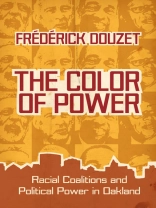The Color of Power is a fascinating examination of the changing politics of race in Oakland, California. Oakland has been at the forefront of California’s multicultural changes for decades. Since the 1960s, the city has been a shining example of a fruitful liberal black-and-white political partnership and the successful incorporation of black politicians into the political landscape. But over the past forty years, the balance of power has changed as a consequence of dramatic demographic trends and economic circumstances. The city’s formerly dominant biracial political machine has been challenged by the demands of new multiracial interests.
The city, once governed by a succession of black mayors and majority black city councils, must now accommodate rapidly growing Asian and Latino communities. While the black-led coalition still relies on white progressive support, this alliance has weakened due to a shift in the progressives’ agenda and the voting habits of the black community, the rise of a Hispanic-Asian coalition, and a strong demographic decline of the African American population. With similar demographic changes taking place across the nation, Oakland’s experience provides insight in to the multiracial future of other American cities.
The Color of Power investigates Oakland’s contemporary racial politics with a detailed study of conflicts over issues like education, elections and political representation, and crime. Trained as a journalist, a political scientist, and a geographer, the author provides a unique perspective supported by numerous maps and extensive interviews.
Winner of awards from the French Society of Geography and the French National Academy of Sciences
เกี่ยวกับผู้แต่ง
Frédérick Douzet is Associate Professor at the French Institute of Geopolitics of the University of Paris 8 and the coeditor (with Thad Kousser and Kenneth P. Miller) of The New Political Geography of California.
George Holoch has translated such works as Orphans of the Republic: The Nation’s Legislators in Vichy France (by Olivier Wieviorka) and Lafayette: Hero of the American Revolution (by Gonzaque Saint Bris).












